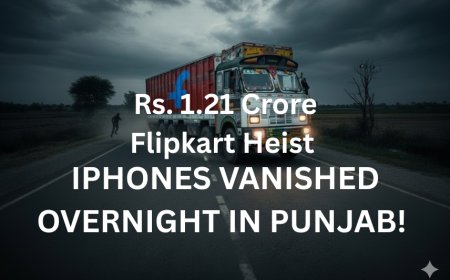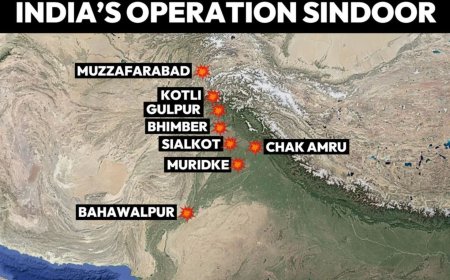The Inside Story of Punjab’s ₹1.21 Crore Flipkart iPhone Heist
Discover how a ₹1.21 crore Flipkart iPhone shipment vanished overnight in Punjab, the investigation, and the shocking details behind the heist.

It sounds like a movie scene: a truck loaded with more than 200 iPhones worth over ₹1.21 crore goes missing overnight. But this wasn’t fiction. It happened in Ludhiana, Punjab, just days before Flipkart’s Big Billion Sale. The theft has now turned into one of the biggest e-commerce crime stories of the year, raising serious questions about security and insider involvement in India’s delivery networks.
Let’s break down what really happened, how the investigation unfolded, and what this means for the future of e-commerce logistics in India.
When the Truck Disappeared
It began as a routine delivery. A Flipkart logistics truck, operated by a Gurgaon-based transport partner, was scheduled to move more than 11,000 parcels from Haryana to Flipkart’s warehouse in Khanna, Ludhiana. The driver, Nasir, a recent hire from Rajasthan, and his assistant, Chet, were assigned to the job.
The truck was loaded in Bhiwandi, Mumbai, carrying everything from everyday orders to high-value electronics, including iPhones and premium smartphones. The journey went smoothly until the truck reached Khanna.
Here’s where things took an unexpected turn. As soon as the truck arrived at the warehouse, the assistant abruptly abandoned it and disappeared. The vehicle was left parked inside the warehouse premises, unlocked. When staff began unloading and scanning the parcels, they realized something wasn’t right.
A total of 234 parcels were missing; 221 of them were iPhones, and the rest were other expensive mobile devices. The estimated value of the stolen goods: ₹1,21,68,373.
The logistics firm’s field operations manager immediately informed the police, and a formal complaint was filed. What initially looked like a simple case of negligence quickly turned into a major investigation involving multiple states.
The Investigation Begins
Ludhiana Police moved fast. A case was registered under several sections related to theft, criminal conspiracy, breach of trust, and cheating. Early leads pointed to an inside job. Both the driver and his helper had vanished, their phones switched off.
Investigators believe the theft was pre-planned. The two men appeared to have detailed knowledge of the consignment’s contents and timing. The police started tracking their trail across Rajasthan and Haryana, conducting raids and scanning CCTV footage from multiple checkpoints along the route.
Technical teams began analyzing digital lock data, GPS movement logs, and route history from the truck’s telematics system. The logistics company launched an internal audit, cross-verifying driver credentials, past delivery routes, and parcel handling records.
So far, preliminary evidence suggests that Nasir and Chet might have coordinated with an external group that specializes in reselling stolen electronics through grey markets. Authorities are now tracing resale attempts through the serial numbers of the stolen iPhones.
How Insider Collusion Is Shaping E-commerce Risks
This case has shaken up more than just one logistics company. It highlights a growing problem that’s quietly spreading across India’s booming e-commerce sector—insider theft.
India’s online retail industry depends on thousands of logistics workers who move millions of packages every day. But as volumes rise, so does the risk of human error, weak oversight, and sometimes, collusion.
Experts say background checks are often rushed or skipped because of the high demand for delivery staff during peak seasons like festive sales. Many temporary or contract-based workers handle high-value shipments without sufficient screening or monitoring.
Criminal networks are also getting smarter. Instead of targeting warehouses directly, they now recruit insiders: drivers, loaders, or helpers who already have access to secure zones. These insiders know exactly when and where valuable consignments are being moved.
The Flipkart case is a wake-up call for the industry. It shows that as e-commerce gets more sophisticated digitally, its physical layer, the supply chain, is still vulnerable.
The Gaps in the System
Incidents like this expose how a few overlooked details can lead to massive financial losses. Logistics systems today rely heavily on trust and manual verification. In many cases, digital monitoring exists, but it’s only checked after a problem occurs.
For example, GPS tracking might show that the truck followed its assigned route, but it won’t reveal whether someone tampered with boxes during the trip. Similarly, CCTV cameras at warehouses often cover only the entry and exit points, not the loading areas where theft might happen.
Even when technology is available, coordination between logistics partners, warehouse staff, and e-commerce teams isn’t always tight enough. The delay between a delivery arriving and being scanned creates a small but dangerous gap—enough for someone with access and intent to strike.
What Companies Can Learn From This
The Ludhiana theft isn’t just a story of missing iPhones; it’s a case study in what can go wrong when security is treated as a checkbox.
Here are a few lessons logistics and e-commerce companies can take away:
-
Verify your people thoroughly: Vet drivers, helpers, and warehouse staff through detailed background checks, even during rush seasons.
-
Monitor trucks in real time: Use GPS systems that alert managers when a vehicle stops unexpectedly or deviates from its route.
-
Digitize every checkpoint: Instead of manual logs, use automated scanning systems at every loading and unloading stage to create traceable digital records.
-
Install tamper-proof tracking devices: Smart locks and sealed containers can send instant alerts if opened mid-route.
-
Create a security culture: Employees should know that theft prevention is everyone’s responsibility, not just the manager’s.
Preventing theft isn’t only about technology. It’s also about mindset. If workers see that protocols are taken seriously, they’re less likely to test the system.
Flipkart’s Response and Market Reaction
Following the incident, Flipkart confirmed that it was fully cooperating with the police and assisting investigators with data and records. The company’s logistics partner has also launched an internal probe.
What makes this theft particularly damaging is its timing. It happened right before Flipkart’s flagship Big Billion Sale, a period when customer trust, brand reputation, and operational efficiency matter most.
In such a competitive market, any major security breach can ripple through the ecosystem. Customers start questioning reliability, sellers worry about inventory safety, and partners face added pressure to strengthen their own safeguards.
Several industry observers believe that this case will push logistics companies to adopt stricter verification systems and tech-driven audits. Some are already exploring blockchain-based shipment tracking to ensure transparency across every stage of a parcel’s journey.
What Happens Next
Police are continuing their search for Nasir and Chet. Raids are ongoing in Rajasthan and Haryana, and investigators are tracking digital footprints and phone connections linked to the two men.
The logistics firm is working with authorities to trace the stolen goods using IMEI numbers from the missing iPhones, which could eventually help recover at least part of the shipment.
Meanwhile, e-commerce platforms are tightening their internal policies—requiring more frequent security checks, verified partner contracts, and training programs for delivery staff.
The outcome of this case might set a precedent for how future investigations into e-commerce thefts are handled, especially those involving insider links.
The Real Cost
Beyond the ₹1.21 crore loss, this theft has exposed something far bigger: a trust gap. The entire e-commerce chain runs on trust. Buyers trust sellers, sellers trust the platform, and platforms trust their logistics partners. When that chain breaks, it doesn’t just cost money; it shakes confidence.
India’s e-commerce industry has made incredible progress in digital payments, customer service, and delivery reach. But as this case shows, physical logistics still need stronger systems and accountability.
The Flipkart truck heist is not just about two men disappearing with iPhones. It’s a reminder that security in the digital economy isn’t only about firewalls and passwords. Sometimes, it’s about a truck on a highway, a driver with a plan, and a system that didn’t look closely enough.
What's Your Reaction?
 Like
0
Like
0
 Dislike
0
Dislike
0
 Love
0
Love
0
 Funny
0
Funny
0
 Angry
0
Angry
0
 Sad
0
Sad
0
 Wow
0
Wow
0































































































